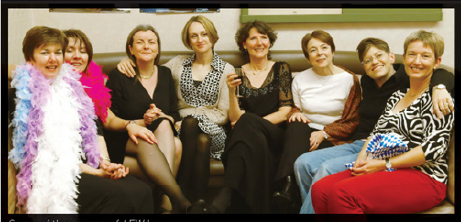by Elise Mori
The Association of Foreign Wives of Japanese (AFWJ) celebrates 40 years of connecting foreign women here in Japan. In this issue, we talk to Sue Conolly about her role in the association and the advantages of being a foreign parent here in Japan.
Whether you are married to a Japanese national or not, the story of the Association of Wives of Japanese is an inspiration to alt of us living in Japan, with or without children.
Weekender: Sue, what is your role in the AFWJ?
Sue Conolly: I’m the PR coordinator now. but I’ve done various jobs – convention coordinator, national secretary, president. You get out of an experience what you put into it!
Weekender: How was the AFWJ founded? Who founded it?
SC: Joan Itoh founded the AFWJ because she needed a group of peers; other women who were living, as she herself calls it: “her rather unorthodox lifestyle.” In 1968, whilst doing some Christmas shopping in Tokyo, she saw another foreign woman on a bus. The woman had a lovely little girl with her who obviously had a Japanese father. After a few stops, the woman left. Thinking about the woman on the long train ride back to Niigata, where she was living at the time, the idea of founding the AWFJ gradually started to germinate. In the spring of 1969 the first meeting was planned at the American Club. They expected about 17 women. Forty seven excited women showed up.
Weekender: What do you think is the main function of the Association? What can it do for a regular person living in Japan?
SC: Connections, connections, connections. If by ‘regular person,’ you mean ‘mothers of babies,’ then you will find the organization filled with mothers of babies [many have their babies in the same month and are able to keep up with each other by phone and email). You will also find the organization filled with career women, English teachers, and artists and writers, there is even a Buddhist monk. If by ‘regular person’ you mean ‘someone who is struggling’ then you will probably find someone who shares your experience.
“I love to count myself among those who catapulted themselves off
into the wide world like some wind-borne seed.
I love the fact that my kids are part of the bicultural revolution.”
Those trying to have children for years and years support each other through the heartaches and those who lose a relative find friends on their doorstep ready to help. There are members who came here before World War Two and members who arrived last year. But despite the diversity of our members, there always seems to be something to talk about.
Weekender: What do you think are the advantages of being a foreign partner of a native Japanese person? And what are the challenges?
SC: The challenges are the advantages. The good thing about a cross-cultural marriage is that nobody expects it to be a picnic. When you’re married to someone from a very different background, this starts to become second nature.
Weekender: And what about the opportunities in being foreign in Japan, whether you’re a parent or not?
SC: I like being cast outside of a mold. The great thing here is that you don’t have to fit into anyone else’s idea of the ‘general scheme of things.’ As a parent you can choose from any parenting style you think might work, as a person you can treat your career like a blank canvas and once you’re here a while, you realize there are many more possibilities than you first imagined. I love to count myself among those who catapulted themselves off into the wide world like some wind-borne seed. I love the fact that my kids are part of the bicultural revolution.
The Association of Foreign Wives of Japanese celebrates its 40th anniversary this year. Find out more about the association at: www.afwj.org.









